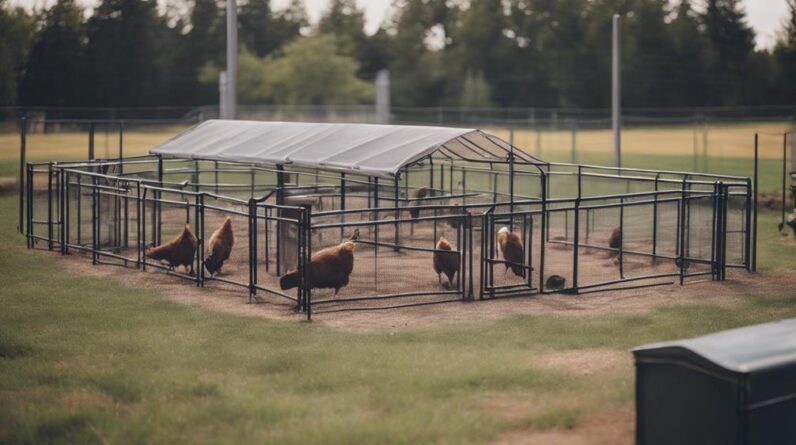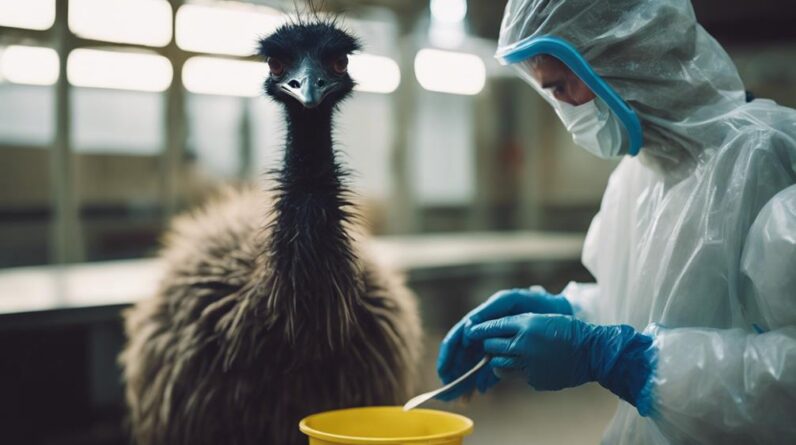
To ensure the health and well-being of your emu, understanding the risks of diseases they may face is paramount. From vaccinations to proper nutrition and hygiene, there are key steps you can take to protect your emu from illnesses. But what about the less obvious threats that could be lurking? Stay tuned to uncover the subtle yet significant aspects of disease prevention that can safeguard your emu's health in the long run.
Key Takeaways
- Regularly inspect emus for signs of parasites to prevent harm.
- Vaccinate emus regularly to boost their immune systems.
- Provide high-quality feed and fresh water for proper nutrition.
- Maintain clean living quarters to prevent infections.
- Early disease detection and management are crucial for prompt treatment.
Understanding Emu Health Risks

To safeguard your emu's well-being, it's crucial to grasp the potential health risks they may face. Emus, despite their hardy nature, can still fall victim to various health issues. One common concern is parasites. These pesky organisms can cause discomfort and harm to your emu if left unchecked. Regularly inspecting your emu for signs of parasites, such as changes in behavior or physical appearance, is essential for early detection and treatment.
Another health risk to be aware of is respiratory infections. Emus are susceptible to respiratory issues, especially in damp or poorly-ventilated environments. Keeping their living quarters clean and providing adequate ventilation can help prevent these infections. Additionally, stress can weaken your emu's immune system, making them more vulnerable to illnesses. Ensuring they have a stress-free environment with proper nutrition and social interaction is key to maintaining their health.
Importance of Vaccinations
Vaccinating your emu is crucial for protecting them against a range of preventable diseases. Just like you prioritize your health, ensuring your emu receives the necessary vaccinations is a powerful way to safeguard their well-being.
By staying up to date with vaccinations, you're taking a proactive stance in defending your emu against potentially harmful illnesses that could otherwise pose a threat to their health and vitality. These vaccines are designed to boost your emu's immune system, empowering them to fight off diseases effectively.
Proper Nutrition for Emus

Ensure your emu maintains optimal health by understanding the importance of providing them with proper nutrition. Emus, like any other living being, require a balanced diet to thrive. Here are some key factors to consider when feeding your emu:
- High-Quality Feed: Opt for a specially formulated emu feed that meets their unique dietary needs. Look for feeds rich in protein and low in carbohydrates.
- Fresh Water: Ensure your emu has access to clean, fresh water at all times. Hydration is crucial for their overall health and well-being.
- Fruits and Vegetables: Supplement their diet with a variety of fruits and vegetables. Emus enjoy a range of produce such as carrots, apples, and leafy greens.
- Monitor Intake: Keep an eye on how much your emu is consuming. Overfeeding can lead to health issues, so it's essential to portion their food appropriately.
Maintaining Clean Living Environment
Maintaining a clean living environment for your emu is essential for their health and well-being. Emus are susceptible to various diseases, and a clean living space can help prevent many of these issues. Regular cleaning and disinfection of their enclosure is crucial to minimize the risk of infections and parasites. Ensure that the bedding is changed frequently, and feces are removed promptly to prevent the accumulation of harmful bacteria. Providing fresh water daily is also important to keep your emu hydrated and healthy.
To help you visualize the importance of maintaining a clean living environment for your emu, here is a simple table outlining the key tasks to focus on:
| Tasks | Frequency | Importance |
|---|---|---|
| Cleaning the enclosure | Daily | High |
| Changing bedding | Regularly | Medium |
| Removing feces | Daily | High |
Identifying Common Diseases Early
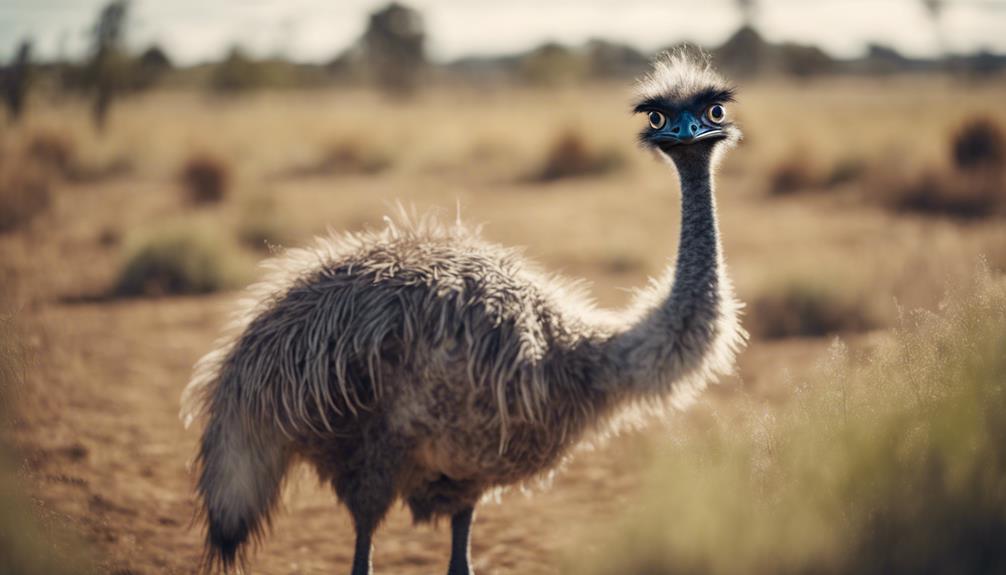
Regularly monitoring your emu's health and behavior can help you detect common diseases early. By staying vigilant, you empower yourself to catch any potential issues before they escalate.
Here are some key signs to watch for:
- Changes in Appetite: A sudden decrease or increase in your emu's food intake could indicate an underlying problem.
- Unusual Droppings: Keep an eye on the consistency, color, and frequency of your emu's droppings as changes can signal health issues.
- Abnormal Behavior: Any deviations from your emu's usual behavior, such as lethargy, aggression, or excessive vocalization, shouldn't be ignored.
- Physical Symptoms: Regularly check your emu for signs like feather loss, skin lesions, swelling, or discharge, which could indicate a health issue.
Regular Veterinary Check-Ups
To ensure your emu's optimal health and well-being, scheduling regular veterinary check-ups is key. These check-ups play a crucial role in detecting any potential health issues early on, allowing for prompt intervention and treatment. Your veterinarian will conduct a thorough examination, checking for signs of illness, monitoring weight, and addressing any concerns you may have about your emu's health.
| Benefits of Regular Veterinary Check-Ups | Description |
|---|---|
| Early Disease Detection | Catching potential issues early can prevent them from developing into more serious conditions. |
| Preventive Care | Vaccinations and parasite control can be administered to ensure your emu stays healthy. |
| Nutritional Guidance | Receive advice on the best diet for your emu's specific needs to maintain optimal health. |
| Health Monitoring | Regular check-ups help track your emu's health progress and address any changes promptly. |
| Behavior Evaluation | Discuss any behavioral concerns and receive guidance on managing and improving your emu's behavior. |
Emu Parasite Prevention

Ensuring your emu remains healthy involves implementing effective strategies to prevent parasites. Parasites can pose a significant threat to the well-being of your majestic bird. By taking proactive measures, you can protect your emu from these harmful invaders.
Here are some essential tips to help you in emu parasite prevention:
- Regularly Inspect Your Emu: Conduct frequent visual inspections of your emu to check for any signs of parasites such as feather loss, irritated skin, or unusual behavior.
- Maintain Clean Living Conditions: Keep your emu's living area clean and dry to prevent the buildup of parasites in the environment.
- Implement a Preventative Parasite Treatment Plan: Consult with your veterinarian to establish a regular parasite prevention schedule tailored to your emu's specific needs.
- Monitor Your Emu's Health: Stay vigilant and monitor your emu's overall health and behavior closely, as early detection of parasites can lead to more successful treatment.
Implementing Biosecurity Measures
Implementing biosecurity measures is crucial to safeguarding the health and well-being of your emu. By establishing a robust biosecurity plan, you can effectively prevent the introduction and spread of diseases within your emu flock. Start by controlling access to your emu enclosure, limiting the entry of unauthorized individuals or vehicles that may carry potential pathogens. Regularly disinfecting equipment, tools, and footwear can help mitigate the risk of disease transmission. Additionally, practicing proper hygiene by washing your hands before and after handling your emus is essential.
Quarantining newly acquired emus before introducing them to the existing flock is a critical biosecurity measure. This isolation period allows you to monitor the health of the new emus and prevent the potential spread of diseases. Monitoring your emus for any signs of illness and promptly isolating sick individuals can help contain outbreaks. Remember, biosecurity is a powerful tool in protecting your emus from diseases, so stay vigilant and proactive in implementing these measures.
Managing Stress in Emus
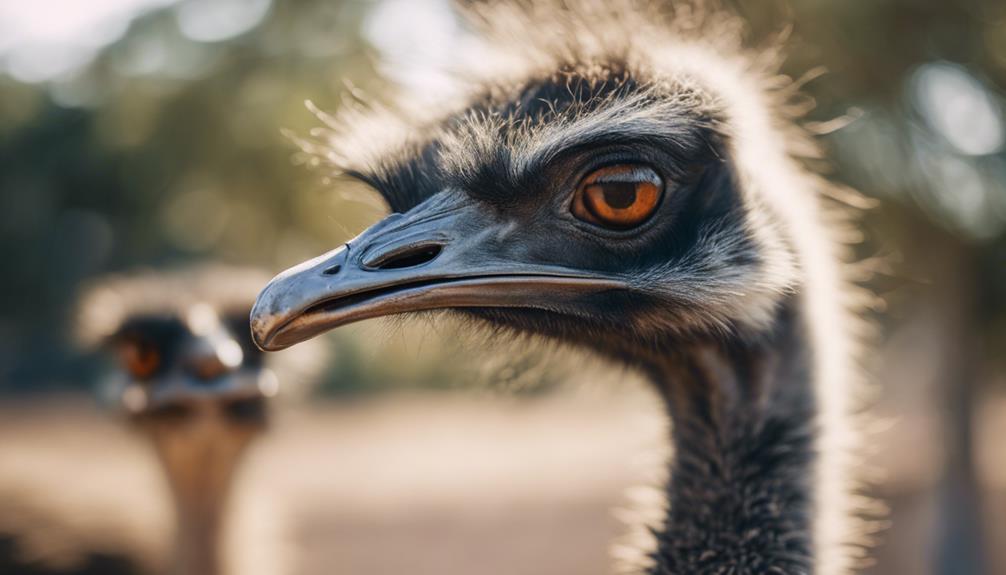
Minimize stressors in your emus' environment to promote their overall well-being and health. Emus, like any other living creature, thrive in a calm and harmonious setting. Here are some essential strategies to help you manage stress in your emus effectively:
- Provide Adequate Space: Ensure your emus have enough room to move around freely without feeling cramped or confined.
- Maintain Consistent Feeding Schedule: Establish a routine feeding schedule to provide your emus with a sense of security and predictability.
- Limit Loud Noises: Emus can be sensitive to loud noises, so try to keep their environment as quiet as possible to prevent unnecessary stress.
- Introduce Enrichment Activities: Stimulate your emus mentally and physically by incorporating enrichment activities like foraging for treats or providing them with safe objects to interact with.
Quarantine Protocol for New Emus
How can you ensure the health and safety of your new emus through an effective quarantine protocol? When introducing new emus to your existing flock, it's crucial to implement a strict quarantine protocol to prevent the spread of diseases.
Start by isolating the new emus in a separate, well-ventilated area away from your established birds. This will help minimize the risk of potential infections being transmitted. Monitor the new emus closely for any signs of illness, such as lethargy, decreased appetite, or abnormal droppings.
During the quarantine period, make sure to provide fresh water, high-quality feed, and a clean living environment to support the new emus' health and well-being. It's recommended to consult with a veterinarian to develop a quarantine plan tailored to your specific situation.
Safe Handling Practices
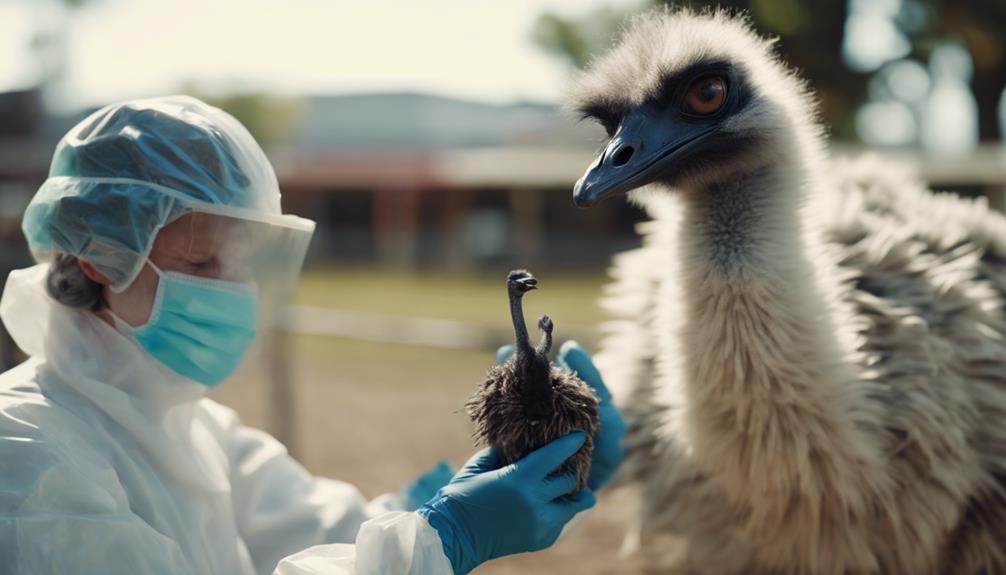
To safely handle your emus, prioritize gentle and confident interactions to build trust and minimize stress. Emus are sensitive creatures that respond well to calm and assertive handling. Here are some essential safe handling practices to ensure the well-being of your emus:
- Approach your emus slowly and calmly, avoiding sudden movements that may startle them.
- Use a confident yet gentle touch when interacting with your emus, showing them that you're in control.
- Always maintain a respectful distance from your emus to give them space and prevent them from feeling threatened.
- Be observant of your emus' body language, as it can provide valuable insights into their mood and comfort level.
Emergency Response Plan
When handling your emus, unforeseen emergencies can arise, necessitating the development of an effective Emergency Response Plan to ensure the safety and well-being of your feathered companions. Having a robust plan in place empowers you to act swiftly and decisively in times of crisis. Start by identifying potential risks specific to your emu habitat and health concerns. Establish clear protocols for different scenarios such as injury, illness, or escape. Ensure all necessary supplies like first aid kits, contact information for veterinarians, and containment tools are easily accessible.
Regularly review and update your Emergency Response Plan to adapt to changing circumstances or new information. Conduct practice drills to familiarize yourself and others involved with the procedures. Communicate the plan with anyone who interacts with your emus, ensuring everyone knows their role in an emergency. Remember, being proactive and prepared is key to safeguarding your emus' well-being.
Frequently Asked Questions
Can Emus Coexist With Other Livestock Animals?
Yes, emus can coexist with other livestock animals as long as you carefully introduce them, provide enough space and resources, and monitor their interactions. Proper management and understanding of each species' needs are essential.
What Are the Best Natural Remedies for Emu Health?
When looking to boost your emu's health naturally, consider incorporating garlic into their diet. Not only does it deter pests, but it also acts as an excellent immune system booster, helping your emu stay strong and healthy.
How Can I Safely Transport My Emu for Vet Visits?
When transporting your emu for vet visits, ensure a secure carrier with proper ventilation. Calmly approach your emu, gently place them in the carrier, and drive carefully to minimize stress. Check on their comfort throughout the journey.
Are There Specific Dangers for Emus in Urban Areas?
In urban areas, various risks exist for emus like traffic, pets, and unfamiliar surroundings. Stay alert, keep emu secure, use caution. Awareness and proactive measures can help navigate potential dangers and keep your emu safe.
Can Emus Be Trained to Recognize Symptoms of Illness?
You can train emus to recognize symptoms of illness. Teach them to respond to specific cues like changes in behavior, appetite, or appearance. This proactive approach can help catch health issues early, leading to better outcomes.
Conclusion
Now that you have the tools to protect your emu from disease, imagine a vibrant flock roaming freely under the clear blue sky, their feathers shining in the sunlight.
With proper care, nutrition, and vigilance, you can ensure their health and happiness for years to come. Stay proactive, stay informed, and watch your emus thrive in a safe and disease-free environment.
Your dedication will be rewarded with the joy of seeing your emus flourish.





